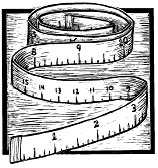Faculty Matters
First, we measure
By Gerald T. O'Connor, Ph.D., D.Sc. (email),
and Susan Benson, M.S., M.P.A. (website)
The faculty and staff at Dartmouth's Center for the Evaluative Clinical Sciences (CECS) are frequently asked, "What do people gain from your academic programs?" The easy answer is to refer to the CECS mantra and say that we teach our students to "measure, organize, and improve health care." But that is only the beginning of the story.

|
|
Perhaps the success of the CECS educational program can best
be measured in the accomplishments of its 186 alumni. |
The CECS was established in 1989 by John Wennberg, M.D., M.P.H., who pioneered the field of clinical outcomes research. CECS researchers raise fundamental questions about health-care outcomes; about treatment variations; and about how medical resources are distributed, decisions made, and systems improved.
It wasn't long before the CECS recognized a shortage of qualified experts to carry out this work, so a master of science program in the evaluative clinical sciences began in 1993, and a Ph.D. program in 1994. CECS students run the gamut from recent undergraduates to experienced physicians, nurses, attorneys, and administrators. Perhaps the program's success can best be measured in the accomplishments of its 186 alumni, as the following examples show.
Outcomes research: CECS research associate Hebe Quinton, M.S. '96, and other CECS researchers, analyzed treatment outcomes for people who had suffered heart attacks across the nation. This geographic analysis revealed that the quality of care is highly variable, that no area of the United States is consistently "best" or "worst" at delivering treatments that comply with best-practice guidelines, and that there is a large gap between current knowledge and practice (Journal of the American Medical Association, February 17, 1999).
Another CECS graduate, pediatrician Pamela C. Jenkins, M.D., Ph.D. '99, measures outcomes and decision-making for managing hypoplastic left heart syndrome (HLHS), a congenital heart defect that affects one or two of every 10,000 newborns. Jenkins has identified survival rates, risk factors for mortality, and optimal treatment choices. Her findings will help parents and clinicians make better decisions when considering the care of infants with HLHS.
Medical decision-making: Last year, two CECS alumni led the effort to establish the Center for Shared Decision Making at DHMC—James Weinstein, D.O., M.S. '95, the center's medical director, and Virginia Beggs, A.R.N.P., M.S. '95, the program director. Considered the first of its kind in the nation, the center advocates a partnership between patient and physician in defining the patient's care and provides a variety of informational tools for patients.
And CECS graduate E. Dale Collins, M.D., M.S. '98, a DHMC plastic surgeon, developed an Internet-based utility assessment to determine patient preference for breast hypertrophy. She also uses her CECS skills as chair of the Outcomes Assessment Program for the American Society of Plastic Surgery.
Health-care improvement: At the CECS, after measurement comes improvement. "Health-care improvement" and "quality improvement" have become buzzwords, but how does one learn to achieve such improvement?
Under the direction of Paul Batalden, M.D., CECS students learn a systems approach to evaluating every aspect of delivering care, from the front office, where appointments are made and patients wait to be seen, to the actual clinical encounter. Students use flow charts to map a patient's movement through a clinical visit to gauge relationships within an outpatient health delivery system, then work with clinical site coordinators to eliminate duplication, streamline processes, and provide better access to care. For example, Frank Marre, D.O., M.S. '96, network medical director for the Group Health Cooperative of Puget Sound, measures improvement in heart care, diabetes, immunizations, women's health care, tobacco cessation, and patient satisfaction.
Physicians across the country are even being trained in CECS quality improvement techniques via two-way interactive television, thanks to the new Veterans Affairs National Quality Scholars Fellowship Program.
New passions: Cardiothoracic surgeon Constance Haan, M.D., M.S. '01, found far more than she expected in the CECS master's program —it awakened a passion for global health care. "I now see the scope of my work in a very different manner—growing from quality improvement on a service and local level, to global health policy."
Haan contends that "CECS teaches one to think on a much larger scale. Epidemiology and biostatistics helped me think about and analyze the disease effect on a population. Quality improvement enhanced my ability to think about the individual patient and/or provider, but in context of . . . the system." The People to People Ambassador Program has invited Haan to visit China later this year to look at women's health.
Whether it's gaining expertise in outcomes research, developing programs to help patients make more informed decisions about their care, creating better access to care, or affecting health nationally or globally, CECS students and alumni are definitely challenging the current paradigm of health care.
O'Connor, a professor of medicine and of community and family medicine at Dartmouth, is associate director of the CECS as well as chief of clinical research for the Department of Medicine. Benson is academic programs director for the CECS.
